Olive
- 195 units available
- Studio • 1 bed • 2 bed
- Amenities
Patio / balcony, Hardwood floors, Dishwasher, Pet friendly, Garage, Gym + more

Making the move to Nashville, Tennessee? You’ll fit right in as you join the scores of other new Nashvillians in the fast-growing metro, with its legendary music scene and healthy job market.
Whether you’re looking for a city with the best live music scene, a lower cost of living, Southern hospitality, or job opportunities, Nashville has a lot to offer. But, like any city, Nashville comes with its own quirks. Heavy traffic and higher housing costs, to name a few. In this guide, we’ll cover everything you need to know before moving to Nashville in 2025.
More of a visual learner? Check out this great video from Living in Nashville on YouTube!
Nashville offers a high quality of life, with a well-known music scene and easy access to the great outdoors. As a major city, it offers residents affordability and maintains a robust job market. One notable downside is the traffic congestion, and the average one-way commute in the city is 24.6 minutes.
Nashville is located in the north-central region of the state of Tennessee. It’s the county seat of Davidson County. A simple two-hour drive from Nashville will bring you to several popular destinations in the area. That includes Chattanooga, with its scenic views and easy access to other popular destinations.
For those lovers of the outdoors, Nashville is in perfect proximity to the Great Smoky Mountains. Clocking in at a four-hour drive, it's the ideal destination for a weekend getaway.
Over the northern border and two hours into Kentucky, the Kentucky Bourbon Trail is another nearby locale. It’s a must-visit location for any whiskey lover. Dozens of bourbon whiskey distilleries are just a hop, skip, and a jump away from Downtown Nashville.
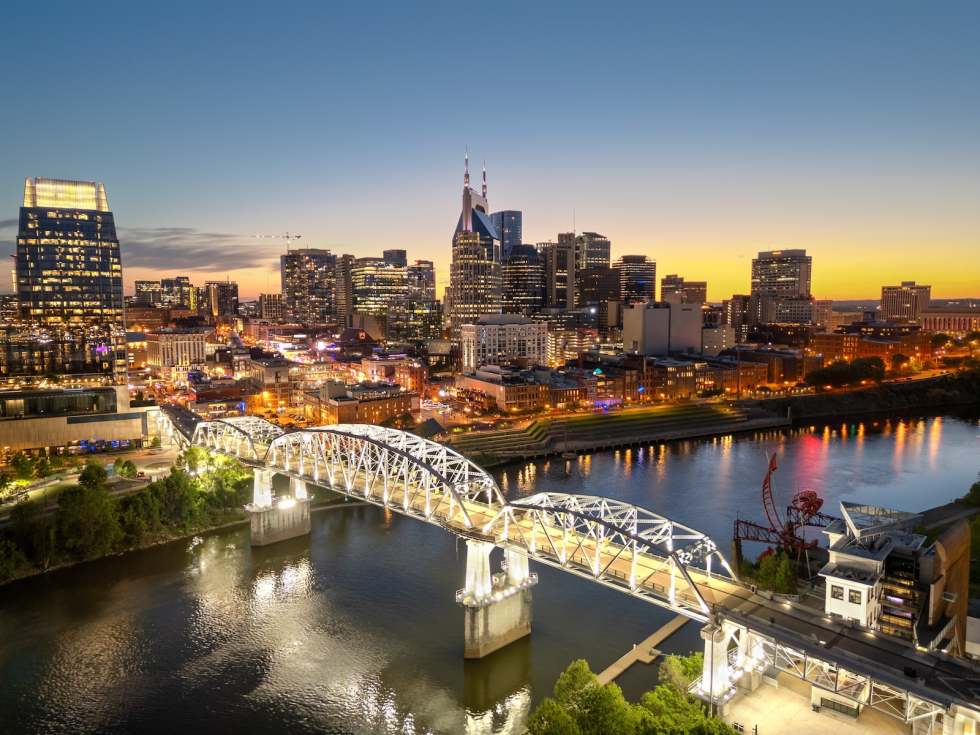
Nashville’s current cost of living is 4.7% higher than the national average and 16.5% higher than the state average. Sperling’s BestPlaces also reports that one adult spends around $4,367 per month, while a family spends $6,600 per month.
Yes, the cost of living in Nashville is manageable for many renters when compared to other major cities. Nashville’s cost of living is 4.7% higher than the national average and 16.5% higher than the state average, which is relatively low for a major city. One downside is the rising housing costs, which are currently 17.1% higher than the national average.
Comparisons with other major cities, such as Atlanta and Chicago, highlight Nashville’s affordability. Atlanta has a 13.3% higher cost of living than the U.S. average, while Chicago has a 5.7% higher cost of living than the national average.
As of September 2025, the average rent price for a one-bedroom apartment in Nashville sits at $1,840. A two-bedroom unit costs $2,292. Keep your eye out for rent specials in Nashville that could save you hundreds on rent.
According to the Apartment List Renter Migration Report, renters in Nashville come from all over the country, but especially Atlanta, Chicago, and New York. It’s a thriving hub for the music industry as well as jobs in the healthcare sector.
Healthcare, arts, and tourism drive the economy in Nashville. Healthcare is the primary employment and economic sector in Nashville, accounting for a significant portion of the city's jobs. Other major industries include music and the arts, tourism, education (particularly university staff), and a growing tech sector. In short, there’s a great variety of jobs available to Nashville residents.
Some of the biggest employers in Nashville are HCA Healthcare, Vanderbilt University Medical Center, Nissan, the U.S. Government, and the state of Tennessee.

According to the MIT Living Wage Calculator, a one-adult household without children must earn around $52,853 per year to live in Nashville and remain above the poverty threshold. Families with two working adults and two children should earn a total household income of $109,533 a year ($9,128 total per month, or around $26.33 per hour for each adult) for the same benchmark.
Considering the 30% rule, which states that you should spend less than 30% of your gross income on housing costs, the necessary salary increases with each additional household member and bedroom. For example, the average rent for a one-bedroom Nashville apartment is currently $1,840, meaning you’d need to earn a gross annual income of at least $73,600 to afford the average one-bedroom rent comfortably.
Nashville has always been a popular city, and people are typically drawn to it for job opportunities or to enjoy a lower cost of living. Its reputation for churning out good food and musicians is unparalleled. However, the city has experienced a substantial population boom in recent years.
Apartment List crowned Nashville as the most changed metro area in the U.S. in the 2010s. Nashville recorded 14.6% population growth from 2010 to 2018. During that time, the workforce also became more educated, households became wealthier, and housing options boomed.
Nashville’s a city that’s currently evolving into a premier Southern metropolitan area. Despite the massive positive shifts, Nashville still retains its affordability as a city with a relatively low cost of living.
Nashville has so much to offer in terms of music. Live music is ubiquitous throughout the city. Restaurants, bars, cafés, and even street corners offer melodic country tunes whenever you visit.
Spots like the Bluebird Café, a music club in the city, have hosted such greats as Taylor Swift, Maren Morris, and Phil Vassar. Patrons of the club enjoy acoustic music sets by up-and-coming and famous artists alike.
Other major music venues include the Grand Ole Opry and the Ryman Auditorium, which host concerts and shows from some of the biggest names in the entertainment industry.
Finally, Broadway, located in Downtown Nashville, is an entertainment hub famed for its plethora of honky-tonks and live music offerings. There are other entertainment options on Broadway, but visitors tend to come and stay for the music.
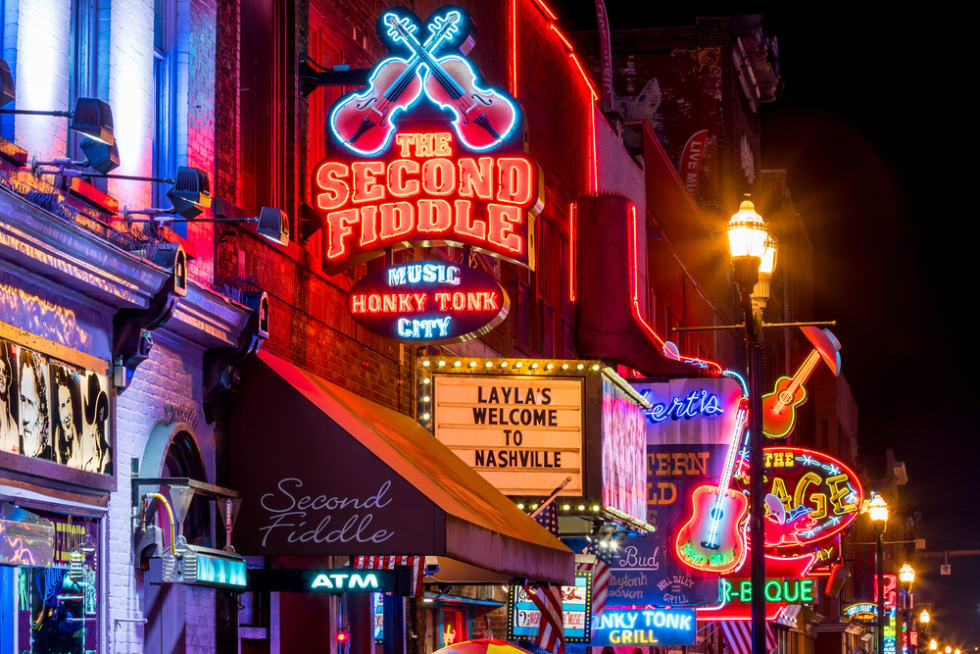
Nashville enjoys a lively nightlife scene, in some part driven by its substantial college-age population. Much like everything else in Nashville, the nightlife scene is driven by music.
Bars and clubs offer live music all night long, so you can eat and drink your fill while enjoying great tunes. New high-rises and an increasingly youthful population have provided more options for those enjoying a night out. You'll find rooftop bars, wineries, karaoke, and more when exploring Nashville at night.
Nashville boasts a collection of unique neighborhoods. As a prospective renter, it's important to understand what each neighborhood has to offer and get a feel for the vibe of the neighborhood to determine which is the best fit for you. Here's a brief rundown of the best neighborhoods in Nashville.
Located near Vanderbilt University, West End Park is a neighborhood of students, university staff, and young professionals. There are tons of entertainment opportunities here, including the aptly named "rock block" for an evening filled with rock music.
As Centennial Park sits in the center of the neighborhood, West End Park is the ideal location for any resident who enjoys the outdoors.
This historic neighborhood is just southwest of Downtown Nashville. It comprises musicians and other members of the arts industry in Nashville.
Known as a tourist destination, Music Row is home to numerous restaurants, bars, and entertainment venues. Residents of Music Row enjoy condos and apartment living.
SoBro, aka South of Broadway, is on the south side of downtown and offers all things trendy and new. Major hotels have set up shop in the area, including the JW Marriott, the Four Seasons, and Hilton Hotels.
In the area, you’ll find live music venues, restaurants with everything from Southern cooking to fine dining, and lively bars. SoBro residents enjoy luxury apartments, condos, and other high-end housing options.
Live music, high-quality restaurants, and lots of entertainment options flood the streets of Midtown. Residents of this neighborhood are generally on the younger side, as students and young professionals appreciate the local nightlife.
However, the neighborhood doesn't give off a college-town vibe. It's a lovely area within the city to escape the hustle and bustle of Downtown.
Speaking of hustle and bustle, Downtown Nashville has lots of both. A goldmine of entertainment and fun awaits anyone who ventures into the neighborhood.
Restaurants, bars, live music—you name it—Downtown Nashville has it. Newly home to trendsetters and honky-tonk lovers, this neighborhood is undoubtedly unique.
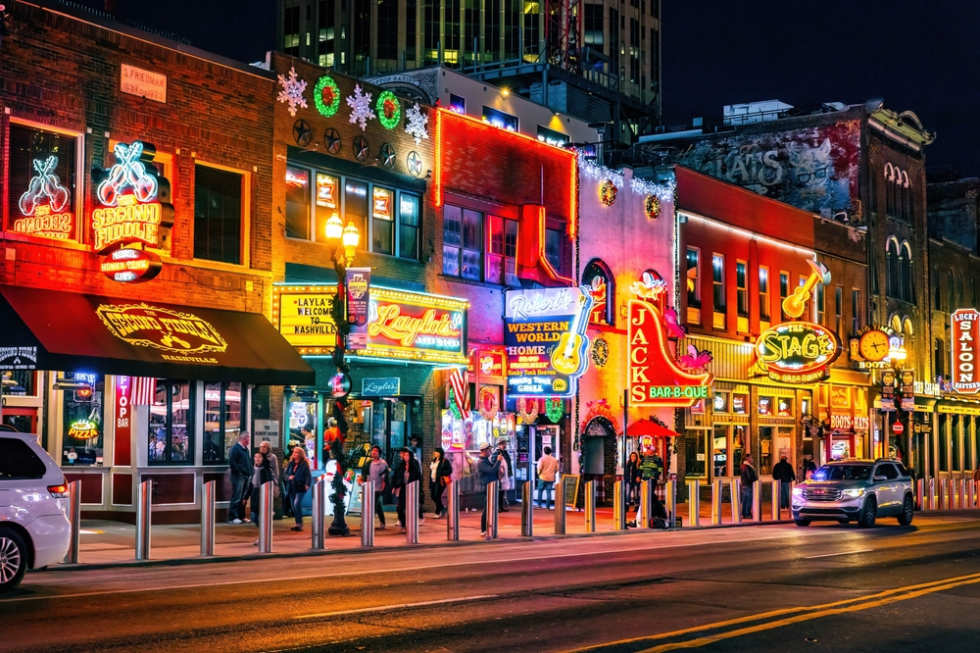
Nashville's neighborhoods are vibrant, especially in Downtown, where music venues, museums, and restaurants are plentiful. East Nashville offers a small-town feel and is home to entrepreneurs, creatives, and independent spirits.
For something more suburban, Green Hills provides a place for shopping, pubs, and the iconic Bluebird Café club. Bellmont-Hillsboro is among the best neighborhoods for students attending Belmont University and Vanderbilt University.
Yes, Nashville is a good place for families to live. It has an overall Niche grade of B+ and a B grade that rates it good for families. That said, the overall public school rating is a C+, so be sure to vet individual neighborhoods for quality schools before moving in with your kids.
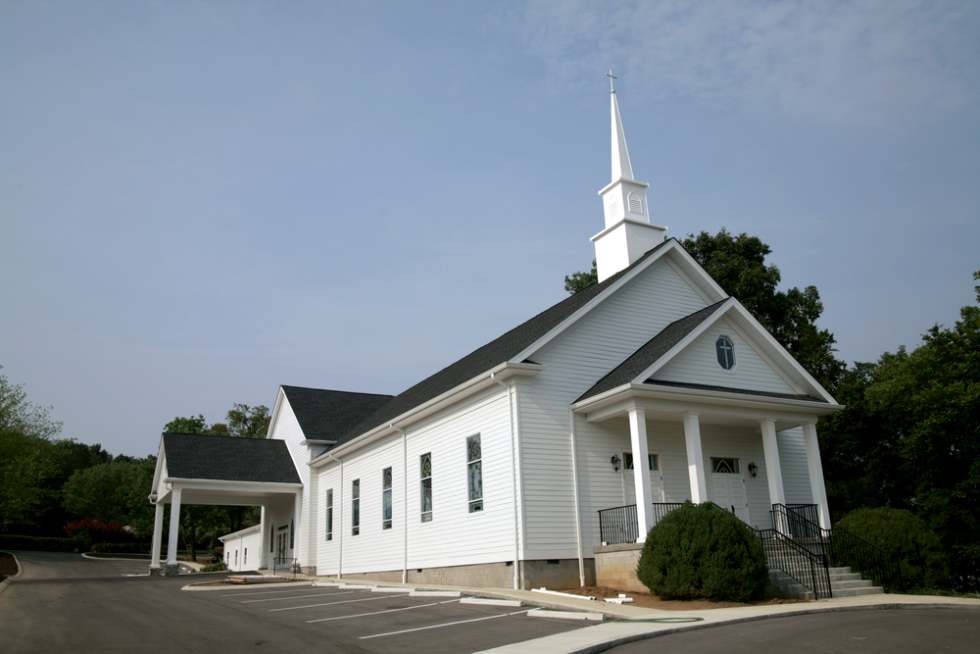
While Nashville is known for its country music culture, it’s also a hub that has produced musicians across various genres, including hip-hop and classical piano.
That said, country music is built into the very DNA of Nashville's music culture. There's a reason the Country Music Hall of Fame is located in the city. The distinct Nashville sound originated in the 1950s and has gripped the city ever since.
As the home of country music, don't expect to escape the sound if you're not a fan. Seriously! Nashville is country music-loving to its core. Anyone who dislikes country music would likely not be a good fit for this city.
Nashville is far from a college town, but it has a significant number of colleges and universities within its city limits. Whether you’re a young professional looking for employment in the education sector or a student looking for the best city in which to spend the next four years, Nashville has something to offer.
Universities located in Nashville:
The upside of having a high number of institutions in Nashville means that education, employment, and entertainment opportunities are in abundance in the city.
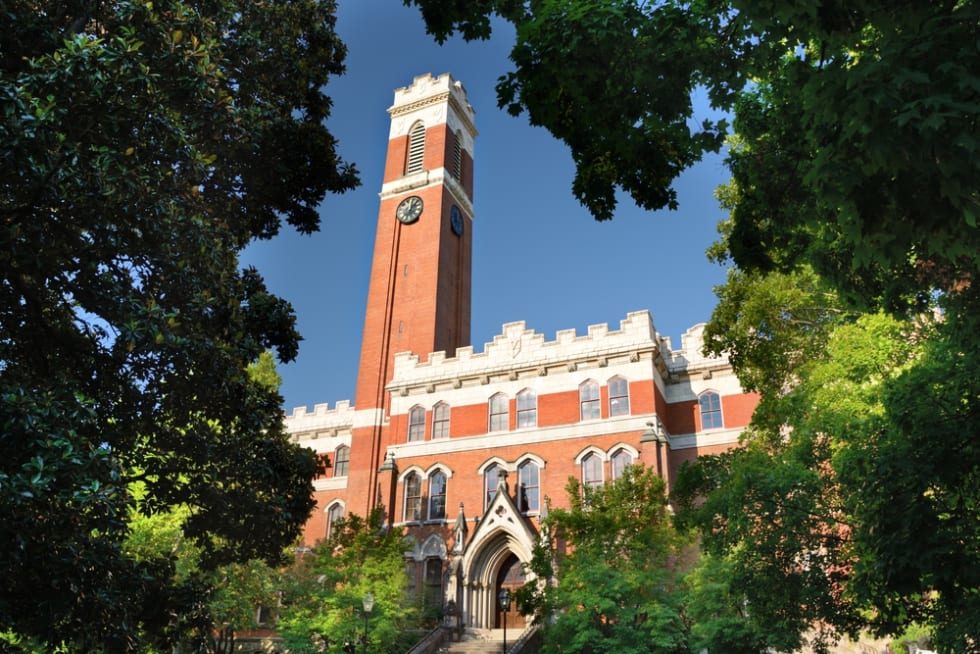
Nashville is known for its warm subtropical climate in summer and mild winters. Residents experience humid, hot summers with temperatures generally ranging from the low eighties to the low nineties.
The winter weather is generally mild, rarely dropping below the low thirties, although it has occasionally dipped lower. However, you'll generally find that Nashville winters are very manageable.
Nashville's weather is mild, but not as temperate as you might expect in the South. Winters are cold and wet, and experience partial cloud coverage year-round. Summers are hot and muggy, but luckily, you're never far from central air conditioning, especially in pubs and restaurants.
Yes, as a Southern city, Nashville is no stranger to the delights of Southern cuisine. In fact, behind music, food might just be Nashville's second-biggest draw. The famous hot chicken, biscuits, grits, barbecue, seafood, and soul food of the South are in great abundance in Nashville.
Nashville is a true foodie's paradise. There are hundreds of breweries, restaurants, bars, and cafés. Each one offers delectable food and drink. Some of the most popular restaurants in Nashville include:
**Butcher and Bee:** Serving the meals that live up to the title of comfort food, Butcher and Bee has something on the menu for everyone, including fresh bakery pastries, burgers, and vegetarian options.
**The Stillery:** Brick-fired pizza, mason jar cocktails, burgers, and salads adorn the menu of this popular Nashville restaurant.
**Arnold's Country Kitchen:** There is nothing fancy about Arnold's Country Kitchen, but it doesn't matter one bit. People keep coming back for the incredible Southern comfort food. It's a must-stop in Nashville.
**Monell's:** For country food served family-style, there's no better place than Monell's. The restaurant has garnered well-earned national acclaim.
**The Loveless Café:** As one of the most well-reviewed restaurants in Nashville (seriously! Over 12,000 reviews and a cumulative 4.6-star rating), the Loveless Café certainly does get a lot of love. Stop by for a boutique experience, great Southern food, and outdoor activities.
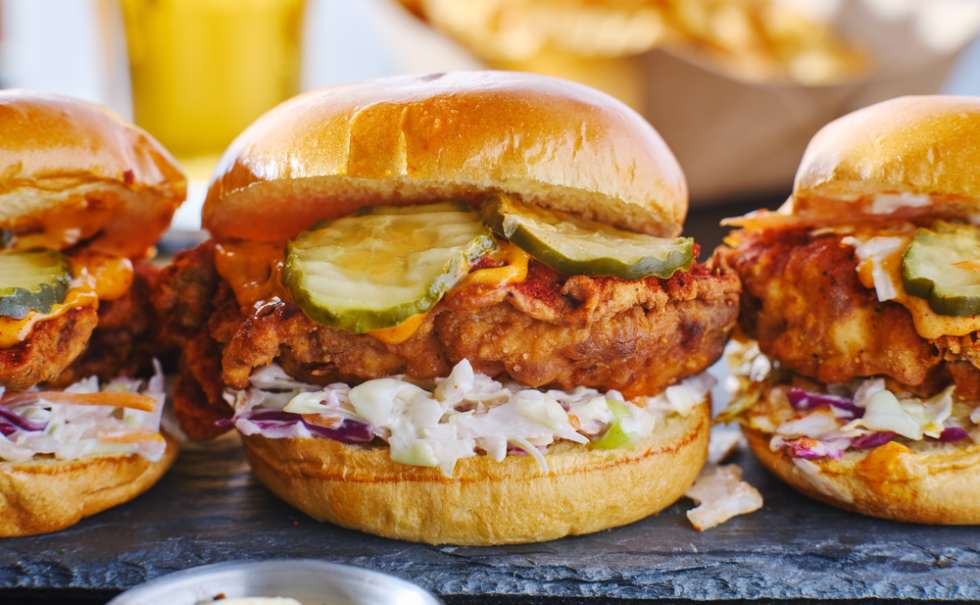
Outdoor lovers rejoice! Nashville has many opportunities for outdoor entertainment. Luckily, you’ll be able to enjoy all of Nashville’s outdoor recreation options year-round due to its mild winters. Here are some of the best outdoor recreation options in Nashville.
Don't forget, Nashville's location also means you can take a weekend vacation hiking the Great Smoky Mountains, less than five hours away by car.
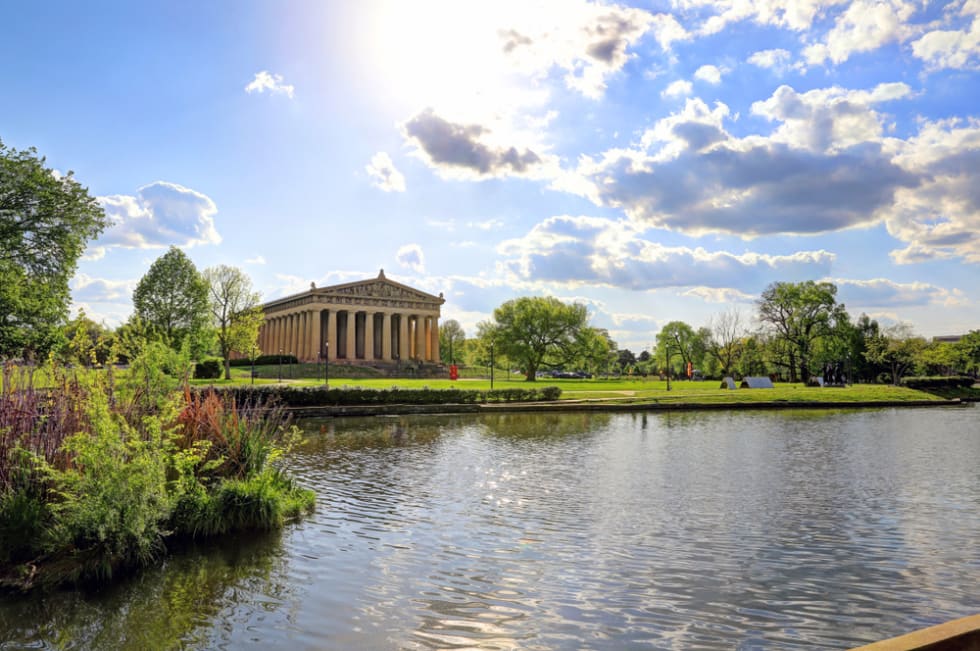
Nashville offers residents public transit through its bus lines, but most Nashville households rely on personal vehicles to get around, with around 95.8% of households reportedly having access to a car.
The unfortunate consequence of the high rate of vehicle ownership is the resulting congestion in the city's traffic. This can result in a significant increase in your commute time.
The Nashville Metropolitan Transit Authority (NMTA) handles public transportation within the city. However, it’s severely lacking in suburban service. Moreover, the system only features bus transportation options, with no rail service.
In 2024, the city passed a referendum to improve and expand its public transportation system with the “Choose How You Move” initiative. The initiative aims to fund various transportation and mobility projects, including enhancements to 285 bus stops, more frequent and extended services, 12 new transit centers, and an increase in local transit services by 1.6 times, along with the introduction of four new express routes.
While the city is investing in the public transit system, it’s currently challenging to get around without a car. For example, the route from Geodis Park to the Nashville Farmers Market is only an 11-minute drive for the 3.9-mile route, but for those using public transportation, it takes an average of 40 minutes.
There are two professional sports teams in the area: the Tennessee Titans (NFL) and the Nashville Predators (NHL), both located in Nashville. As a result, there's no shortage of sports entertainment.
Not to mention, Vanderbilt is a Division I university, with the Commodores competing against other Division I athletes across the country. Baseball, football, basketball, and more—grab some season passes, and you just might witness a future star athlete's beginnings.
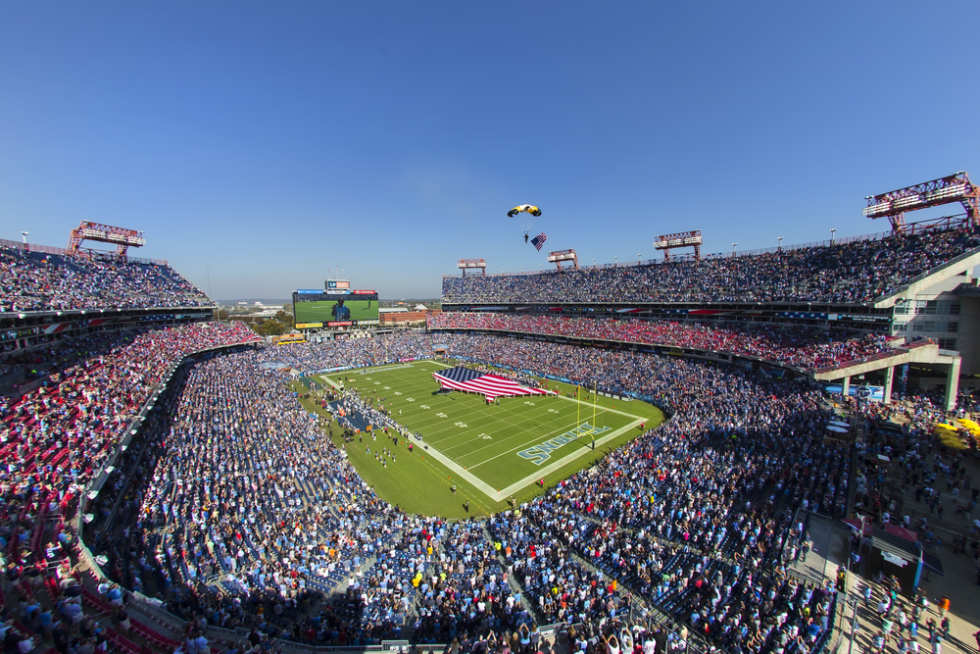
One question: Do you like country music?
If yes, then Nashville is the perfect place for you. If not ...
Regardless of whether you can see yourself patronizing your local honky-tonk, Nashville is a great city. Nestled in the South and boasting a vibrant mix of sports, music, arts, food, and other entertainment opportunities, Nashville has a lot to offer any prospective renter.
If you're ready to move to Nashville, take the Apartment List quiz to narrow down your search in seconds. With us, you’ll spend five minutes and save 50 hours searching.
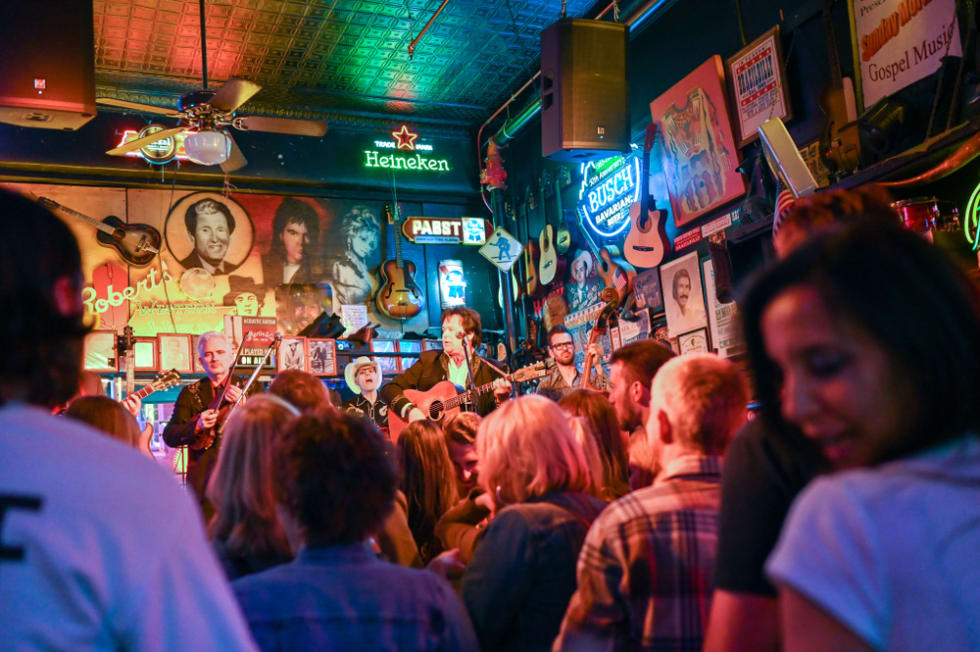
Nashville is on Central Daylight Time. When it's 9:00 a.m. in New York, it's 8:00 a.m. in Nashville.
Nashville is more than honky-tonks and country music, although there's plenty of that, too. Enjoy music at the Grand Ole Opry and the Ryman Auditorium. For local live music, try Tin Pan South or Bluebird Café. Or escape the city for a few hours to nearby Radnor Lake State Park or Centennial Park.
Nashville is located in Davidson County, which is also the second-most populous county in Tennessee. It's also the county seat in Nashville and the state capital.
Nashville welcomes newcomers to its unbeatable music scene, a reasonable cost of living, and a low unemployment rate. As of July 2025, the unemployment rate is 3.7%, as opposed to the national average of 4.2%, and you can build a career in music production, healthcare, finance, higher education, publishing, tourism, and technology. The higher education opportunities are also strong in Nashville, with institutions like Vanderbilt and Belmont universities very close by.
Nashville is a booming city with a small-town vibe. It's filled with a variety of music genres, fabulous dining options, bars, and nightlife. There's also a low unemployment rate. However, you'll need to deal with the hot, humid summers and intense seasonal allergies. Traffic also leaves a lot to be desired when living in Nashville.
Nashville boasts a reputation for live music seven days a week, museums, sports franchises, and a low unemployment rate. Higher education is highly regarded in Nashville, offering numerous opportunities for staff and students. The city frequently ranks among the best places to live, and you can enjoy fine dining or a honky-tonk without leaving Nashville.
Like the rest of Tennessee, Nashville has no income tax on wages, with a 0% income tax rate. However, the minimum combined 2025 sales tax rate for Nashville is 9.75%, which represents the sum of the state, county, and city sales tax rates. Tennessee’s sales tax rate is currently 7%.
Major industries and popular jobs in Nashville include music production, tourism, finance, higher education, insurance, healthcare management, and manufacturing. With a low unemployment rate, Nashville is a welcoming city for newcomers looking to build their careers.
Attending music venues or enjoying live music at bars is one of the most popular things to do in Nashville. The city embraces its country music roots, but it’s also home to rock, independent music, religious artists, and more. The Grand Ole Opry and the Ryman Auditorium are iconic venues, but you can also try Tin Pan South or Bluebird Café to hear undiscovered stars. Or stop by the Frist Art Museum, the Parthenon, the National Museum of African American Music, the Adventure Science Center, and more.




Patio / balcony, Hardwood floors, Dishwasher, Pet friendly, Garage, Gym + more
On-site laundry, Google fiber, Nest technology, Patio / balcony, Hardwood floors, Dishwasher + more